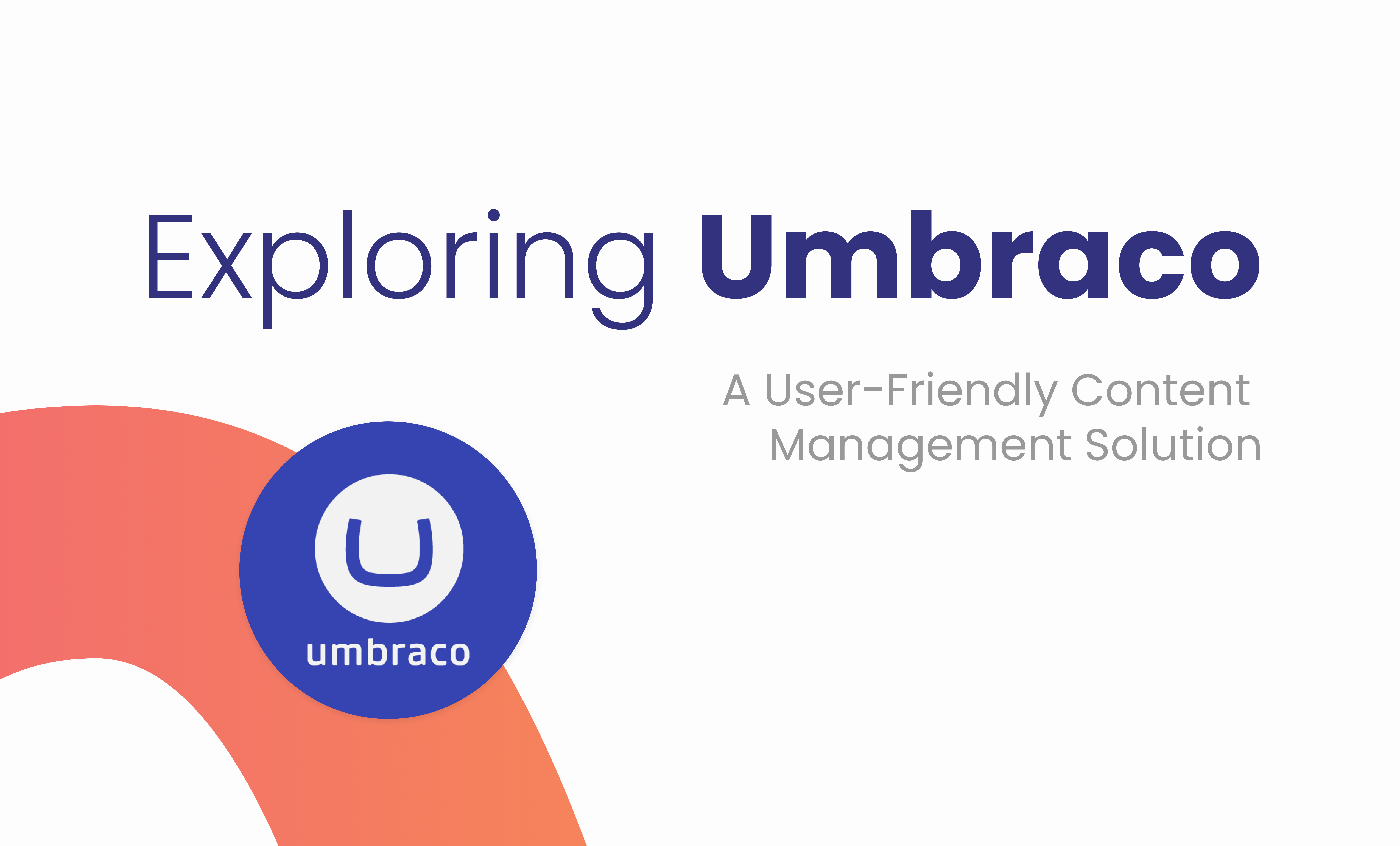
Exploring Umbraco CMS: A User-Friendly Content Management Solution
In the dynamic world of content management systems (CMS), Umbraco CMS stands out as a versatile and user-friendly platform. Designed with simplicity and efficiency in mind, Umbraco offers a seamless experience for both technical and non-technical users alike. Let's delve into what Umbraco CMS is, why it's exceptionally easy to use, and the advantages it brings to the table.


What is Umbraco CMS?
Umbraco CMS is an open-source content management system built on the Microsoft .NET framework. Launched in 2005, Umbraco has become one of the most popular CMS options, known for its flexibility, scalability, and intuitive interface. It empowers users to create, manage, and publish content on websites and web applications without requiring extensive technical expertise.
Let's explore why Umbraco is one of the most popular CMS options out there and if it is the right fit for your business.
1. User-Friendly Interface
One of the key reasons behind Umbraco's popularity is its user-friendly interface. Whether you're a seasoned developer or a content editor with minimal technical skills, Umbraco's intuitive dashboard makes content management a breeze. Umbraco has a clean and organized layout that allows users to navigate effortlessly, create content, and easily manage various aspects of their website.
2. Easy Customization
Umbraco offers unparalleled flexibility when it comes to customization. With its extensive library of plugins, themes, and extensions, users can tailor their websites to meet specific requirements without delving into complex coding. From simple layout adjustments to advanced functionalities, Umbraco provides the tools to customize every aspect of your website according to your business needs.
3. Seamless Content Management
Content creation and management are at the heart of Umbraco CMS. Umbraco's powerful yet straightforward content editing tools enable users to create, edit, and organize content effortlessly.
The intuitive WYSIWYG (What You See Is What You Get) editor allows content editors to format text, add multimedia elements, and preview content in real time, streamlining the content creation process. The WYSIWYG editor in Umbraco CMS is called the "Rich Text Editor" or RTE. With the Rich Text Editor, users can effortlessly design and preview content without needing to know HTML or CSS, making content creation a straightforward process for both technical and non-technical users.
4. Accessibility and Scalability
Umbraco CMS is designed to cater to the needs of users across different skill levels and industries. Whether you're managing a small blog or a large enterprise website, Umbraco's scalability ensures that your website grows with your business. Additionally, Umbraco's commitment to accessibility standards makes it an ideal choice for creating inclusive digital experiences that reach a wider audience.
5. Continuous Support and Updates
Umbraco boasts a vibrant community of developers, designers, and users who actively contribute to its growth and development. Regular updates and patches ensure that Umbraco remains secure, stable, and up-to-date with the latest web technologies. Moreover, comprehensive documentation, tutorials, and forums provide ample support for users seeking assistance or looking to expand their knowledge.
When it comes to choosing a content management system (CMS), the debate between Umbraco and WordPress often arises.
While both platforms have their merits, Umbraco and WordPress cater to different needs and preferences. Let's delve into the distinctive advantages that Umbraco holds over WordPress, shedding light on why it may be the preferred choice for certain users and scenarios.

Umbraco vs. WordPress:
Unveiling the Distinctive Advantages
1. Flexibility and Customization
Umbraco: Unlike WordPress, which primarily caters to bloggers and small to medium-sized websites, Umbraco offers unparalleled flexibility and customization capabilities. Built on the robust Microsoft .NET framework, Umbraco provides developers with a blank canvas to create bespoke digital experiences tailored to specific requirements. Its modular architecture and extensive API support allow for seamless integration with third-party services and bespoke functionalities, making it the preferred choice for enterprises and complex web applications.
WordPress: While WordPress boasts a vast ecosystem of themes and plugins, its customization options are somewhat limited compared to Umbraco. WordPress is well-suited for bloggers, small businesses, and basic websites requiring quick setup and minimal customization. However, for users seeking more intricate customization options and scalability, Umbraco emerges as the superior choice.
2. Security and Performance
Umbraco: Security is a top priority for Umbraco, with regular updates and patches ensuring that the platform remains secure and resilient to cyber threats. Umbraco's architecture, built on the Microsoft .NET framework, offers inherent security features that provide an added layer of protection for websites and web applications. Additionally, Umbraco's flexibility allows developers to implement custom security measures tailored to specific needs, further enhancing the platform's resilience.
WordPress: While WordPress powers a significant portion of the internet, its popularity also makes it a prime target for cyber attacks. Security vulnerabilities in plugins, themes, and core files can pose significant risks to WordPress websites if not addressed promptly. While WordPress has made strides in improving security over the years, users must remain vigilant and proactive in implementing security best practices to mitigate potential risks.
3. Scalability and Enterprise Readiness
Umbraco: For enterprises and organizations with complex digital requirements, Umbraco offers scalability and enterprise readiness that surpasses WordPress. Umbraco's modular architecture and extensive customization options make it well-suited for building robust web applications, intranets, and enterprise-level websites that can seamlessly scale with the growth of the business. Additionally, Umbraco's support for multi-site management and granular user permissions makes it an ideal choice for large-scale deployments.
WordPress: While WordPress powers many high-traffic websites and large-scale deployments, it may face scalability challenges when handling complex web applications and enterprise-level solutions. WordPress' architecture, originally designed for blogging, may require extensive customization and optimization to meet the performance and scalability demands of enterprise users. While WordPress can be adapted for enterprise use cases with the right expertise, Umbraco's out-of-the-box enterprise features make it a more suitable choice for organizations with complex digital needs.
Choosing the Right CMS for Your Needs:
In conclusion, while both Umbraco and WordPress have their merits, the choice between the two ultimately depends on the specific needs, preferences, and technical requirements of the user or organization.
For users seeking unparalleled flexibility, customization, and enterprise readiness, Umbraco emerges as the preferred choice.
However, for bloggers, small businesses, and users prioritizing ease of use and a vast ecosystem of themes and plugins, WordPress remains a formidable option.
By carefully evaluating the distinctive advantages of each platform, users can make an informed decision that aligns with their goals and aspirations in the digital realm.
Still unsure whether to choose Umbraco or WordPress for your business?
Don't worry, we're here to help!
Contact us at Elanwave, where our team of experts can guide you through the decision-making process and ensure you make the right choice for your business needs.
Let's embark on your digital journey together!
Contact us

